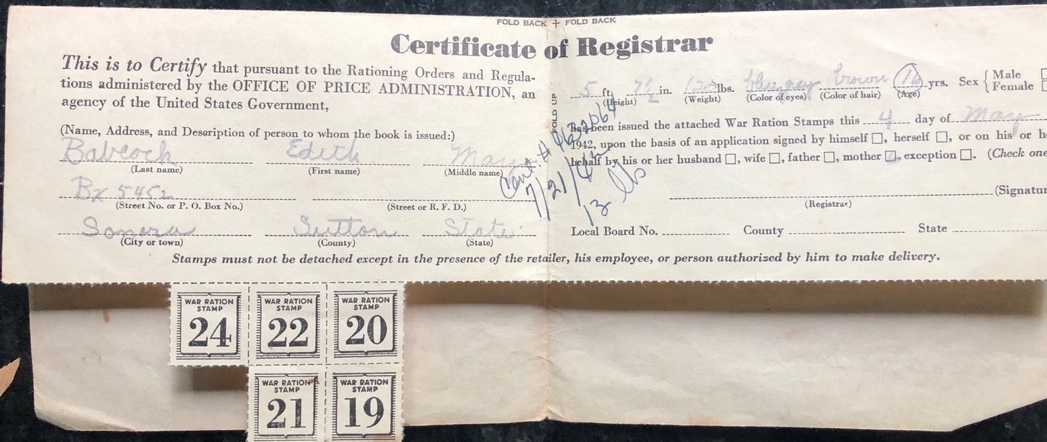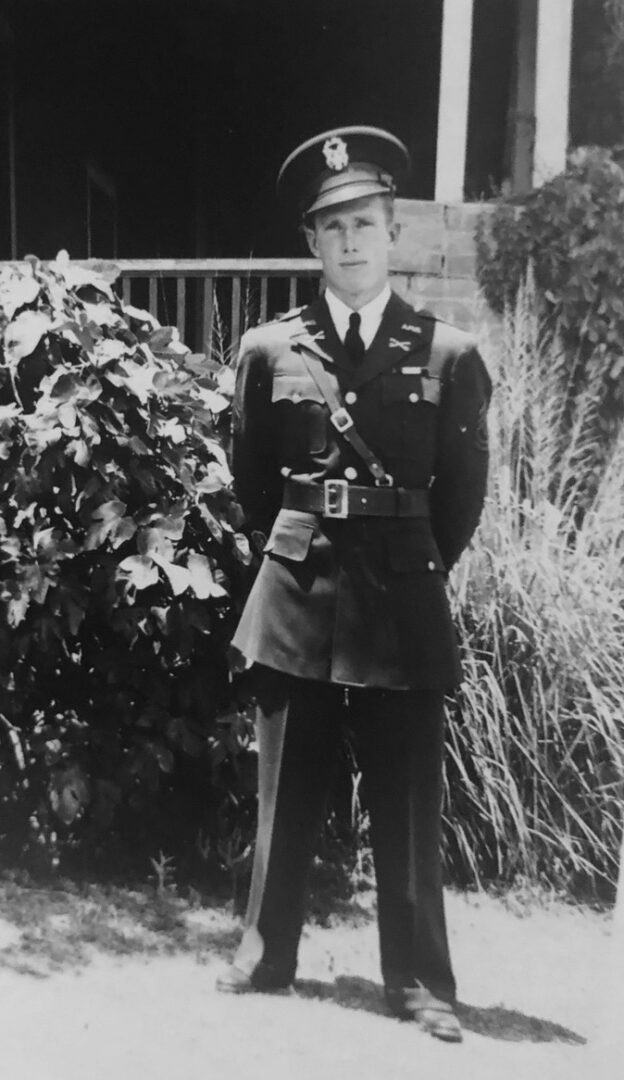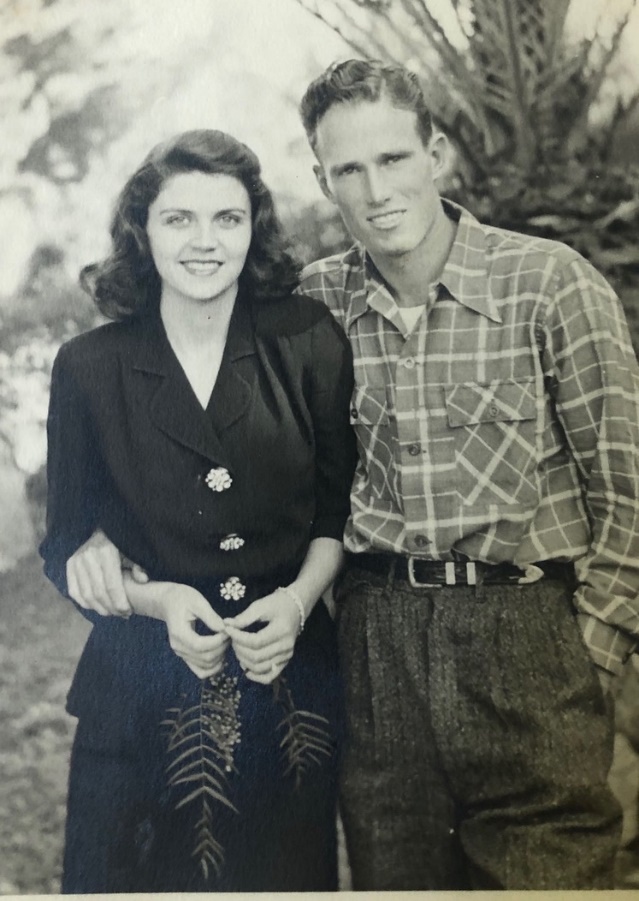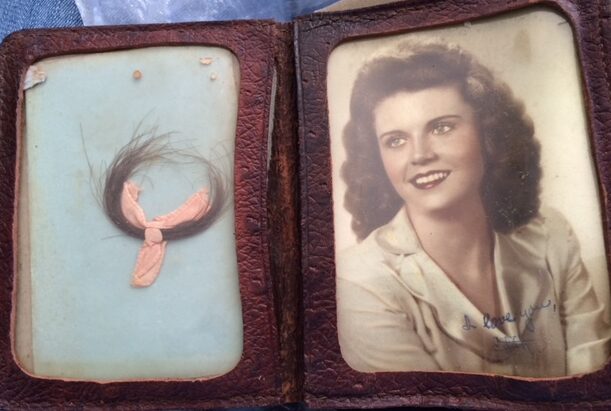I first began this story about my childhood and before I knew what was happening, I found myself telling about my own memories of World War II. So, I started over to tell my story from my first point of view as a youngster. Later, as a teenager, and finally as a young woman.
My story begins the day I first heard of a man named Adolph Hitler. I was in the car with my father and a friend of his on a short trip. I was in the back seat listening to them talking about the Russians. They had been listening to the car radio which was reporting on Germany and that Hitler person. I was shocked to hear what had seemed like screaming and shouting, but I couldn’t understand the words. It was so loud it hurt my ears. I put my hands over them to shut it out. The shouting words were in German. Then my father’s friend remarked that he sure hoped Russia didn’t side with Germany. He was concerned because his wife was from France, and her family was still living there. He was afraid the Germans and Russians would join forces and enter all of Europe. I am not sure of the year, but it was sometime in the late 1930’s. Little did I know that World War II was already beginning. When I heard the spoken word of countries like Czechoslovakia, Poland and Russia, I was familiar with them for I collected dolls as a hobby and had dolls from those countries.
The so called ‘Mad Man’, Adolph Hitler was on the rampage, and soon almost every country in the world would be affected by his actions, including the United States and all of Europe and Asia. Thousands of innocent people would die. Tens of thousands of United States soldiers, sailors and marines would die. Many more would be injured. And many more from almost every country in the world would die or be injured. Six million Jews of all ages would die. All of this would happen in a matter of roughly ten years. Even I would lose friends in this war. My loved ones would participate in the war. My uncle, a career army colonel, would serve in Europe. Many of my teachers would leave our schools to serve. I was soon to hear of the deaths of young men from our own town where everyone knew everyone else. Little did I know or understand what was happening or would happen in the next few years. Indeed, innocence was bliss for a while. I was just glad when they turned off that awful radio that day.
When I was a teenager, I soon experienced the Second World War from afar, as other Americans did, after Pearl Harbor was bombed that Sunday afternoon, December 7th, 1941. Rather, that is the time of day I heard about it on the radio. We had just come home from the movies and found my parents gathered around the radio listening; they put their fingers to their lips as we walked in.
The La Vista Theatre always showed the Movietone News with up-to-date news of the war in Europe, and that day it had shown the thousands of German soldiers goose-stepping their way across the screen. It told of recent invasions by the Germans. A friend and I had been to the movies to see “The Bride Came C.O.D.” with James Cagney and Bette Davis. I was a young teenager, but certainly old enough to be horrified at what was happening. I was too young to even begin to understand the true horrors that were happening and would soon result from this war. Before long I heard of boys who were seniors in high school dropping out of school and lying about their ages to join up. My own brother, who had learned to fly when he was nineteen tried to join the Air Force, but he was rejected because of his severe hearing loss. He still served. There was a real shortage of experienced pilots to instruct the new cadets. My brother soon got his instructor’s license and taught future Air Force pilots basic flying. I will add that he was always able to hear when flying. Something about the air pressure equalizing made that possible. Later, he served in the Air Transport Command and transported planes around the world. I asked him after the war what kind of planes he flew. He told me that he flew every airplane that was made at that time. Finally, he flew the renowned and dangerous ‘Hump’ from Burma to China, transporting fuel, soldiers, and supplies for the remainder of the war. The loss of life on those flights had a very high percentage. Consequently, he lost many friends. The Himalayas were notoriously difficult to fly over in any plane. The C46’s and C47’s were the transport planes they used for this operation. These were ideal planes for flying this route under the severe weather and almost impossible flying conditions, but they had no heat at all, only heavy flying jackets and hats. There was no oxygen except a small container of oxygen for the pilot. If any passengers were aboard, they had none. The planes were not pressurized. Regardless, they flew daily on this treacherous trip until the end of the War with the atomic bomb at Hiroshima and a second at Nagasaki when Japan surrendered. It was a relief to our family when he safely arrived home again after the war.
In 2000 he, along with nearly 400 former pilots and their wives or a family member, were invited by the Chinese government to visit China as their guests for a ten-day tour to see the main attractions such as the Great Wall which spanned 3700 miles and the Terra Cotta Warrior and Horses dating back to 259-210 B.C. But, he was especially thrilled to visit the locations which the Hump pilots used during the war. Though each paid his own airfare from the States to the Chinese mainland, it was well worth the expense. Their hosts had made all other arrangements for food and lodging. Transportation from the airport to their hotels was provided and also for the tour of the country. The highlight of the trip was the official dedication of a Memorial in honor to the Hump pilots of World War II which had just been completed in their honor. It was a very emotional visit for these men and, according to my brother, very moving as they each remembered their lost comrades and those who were not able to attend. My brother had fulfilled a dream of returning to China once again after the War. An interesting note: He had both knees and a hip replaced in order to be able to make the trip.
No one escaped being affected by the war. Everyone physically able to do something toward the war effort was doing. Whether it was rolling bandages at home, writing letters to loved ones, attending funerals of soldiers, donating blood, walking rather than driving to conserve gasoline for which everyone had coupons. Sugar and also meat were rationed, as well as other necessary products to feed or house and clothe our fighting men. Scrap iron was collected, women went to work to fill the jobs vacated by men off to war. Trains and buses were reserved for transporting troops. As they passed through cities and towns the public brought out cookies and fruit, and their best wishes and waved them on. Highways were jammed with the army troops traveling in jeeps and military vehicles, sometimes trailing for miles. Letters from soldiers in all branches of the service were censored. I remember receiving letters from friends and family members, whose letters often arrived with portions cut out. Many young couples about to be separated by war, married at the last minute, and then sadly waved goodbye. For some, it was their last goodbye.
College girls volunteered at USO’s to act as hostesses. Strict rules were to be followed with ample supervision. And curfews were abided. Hostesses dressed up in comfortable party frocks, curled their hair and always tried to greet the servicemen with pretty friendly smiles, good conversation and lighthearted laughter. It was a break for these homesick young men in uniform. They were served sandwiches, coffee and cold drinks, even lemonade in the summer. No alcohol was allowed. Cookies and cakes were usually made by townspeople. The hostesses never turned down an invitation to dance to forties music such as ‘In the Mood’, ‘Chattanooga Choochoo’, ‘Boogie Woogie Bugle Boy’ and ‘I’ll Be Seeing You’. The girls listened while the boys told them about their families, girlfriends, and loved ones left at home. They shared their dreams and often admitted to being homesick, and sometimes even to being scared. Many had never been this far away from home before. Every city and most towns of any size at all, if it was near an army camp, had a USO center where volunteers of all ages helped in some way.


School children from the youngest to the oldest bought war bonds by saving their pennies, nickels, and dimes. Radios blared with patriotic music: ‘Any Bonds Today?’, ‘Coming in on a Wing and a Prayer’, ‘White Christmas’, Rosie the Riveter’, ‘I’ll be Home for Christmas’, and ‘The White Cliffs of Dover’. Clean rags freshly laundered and folded were donated for making bandages. Binoculars were loaned to the government for use by those in the fields of battle. My own father’s were returned after the war.

When President Roosevelt died, most of us had never known another President. We grieved. We prayed the new President Truman would be able to save our country and our boys. I was in college then and remember it so well. The war had been one disaster after another. My fiancé, Robert Hutson Kokernot, served in the Philippines as a combat medic and fought in the Battle of Manilla, the largest urban fighting in the Pacific theatre where over 100,000 civilians lost their lives. I had friends who had lost boyfriends, brothers, fiancés and even fathers. I had heard from a high school friend who had joined the paratroopers and wanted me to write before he left to parts unknown. I hurriedly answered it but never heard from him again. I later learned that his parachute was caught on the wing of the plane when he jumped over Normandy. He died. He was in my thoughts when I visited Normandy some fifty-five years later. I cried in the movie we saw in the museum there, for him and all the thousands who lost their lives there.
When the war ended in August of 1945, after two atomic bombs were dropped, I rejoiced quietly at home with my family, where I was on summer vacation from college. My fiancé would be coming back from the Philippines soon. My brother-in-law who flew B-24s over Germany had already come home. He couldn’t talk about the war. He had a hard time flying in aircraft after that, and though he won many medals for his service, he refused to ever talk about it. I think he grieved the rest of his life over the countless innocent human beings who lost their lives because of the bombings. He held a captain’s rank and turned down a chance for promotion to rank as a colonel. All he needed was one more flight before going home on leave. He refused. He had first joined the RCAF because the U.S. Air Force would not take him because he was two inches too tall. When the United States got into WWII, he was accepted by the U.S. Air Force.

After the war, the troops gradually came home. Most came on the very ships that had taken them overseas to Europe and the South Pacific. Families were reunited. But the United States would never be the same again. It was changed forever. People had changed, too. Many had seen the world. Most had seen a great deal more of the United States than ever before. The G.I. Bill offered to educate any former servicemen who had served during the war. It was a great opportunity for people who might never have set foot in a college or university before the war. Now they had that opportunity.
We were all sure this was the war to end all wars! Everyone had hope for a better world. In 1950 the Korean War began. In 1965 the United States entered the Vietnam War. How many wars have begun off and on around the world as I write? The plague of man has returned. Let us hope and pray that another war as fierce and destructive as World War II will never happen again.


